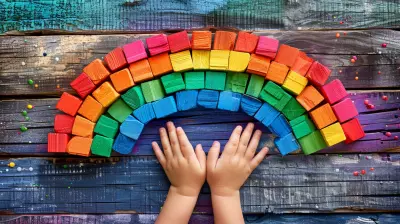Empowering Girls to Stand Up for Themselves and Others
10 November 2025
In a world that’s constantly whispering who girls should be, how they should act, and what they should want—you know what’s truly powerful? Teaching them to raise their voices, stand their ground, and lift others as they rise. Empowering girls to stand up for themselves and others isn’t just about building confidence. It’s about rewriting the narrative, one fierce and fearless girl at a time.
Let’s talk real. We’re not raising girls to fit neatly inside boxes—they were born to break them. This guide is your roadmap as a parent, mentor, or caregiver to nurturing brave hearts, kind spirits, and strong voices.
Table of Contents
1. Why Empowering Girls Matters2. Starting with Self-Worth
3. The Art of Speaking Up
4. Handling Conflict with Grace—not Silence
5. Being Brave Doesn’t Mean Being Perfect
6. Teaching Empathy Alongside Courage
7. Role Models are the Mirrors Girls Need
8. The Power of “No”: Setting Boundaries
9. The Ripple Effect: When One Girl Stands, Others Rise
10. The Wrap-Up: Raising Girls Who Glow and Grow

Why Empowering Girls Matters
Let’s be honest here—society hasn’t always given girls front-row seats at the table. From classrooms to boardrooms, from playground jeers to professional power struggles, the message can often be: sit down, stay quiet, play nice.But guess what? Girls were born to shine, speak, lead, and fly. Empowerment isn’t a luxury—it’s a necessity. It teaches girls that their voice matters, their boundaries are valid, and their presence is powerful.
When a girl learns to stand up for herself, she doesn’t just protect her own space—she makes space for others too. It’s not just personal growth; it’s societal change in motion.
Starting with Self-Worth
Before a girl can stand tall, she needs to know she’s enough—exactly as she is.Self-worth is the soil where confidence grows. And let’s face it, this world doesn’t always nourish it. Between social media filters and unrealistic expectations, the pressure is real.
That’s why it starts at home. Affirm your daughter’s uniqueness. Celebrate her quirks. Normalize her feelings. Show her that her worth is never tied to achievements, looks, or popularity.
Encourage her to talk about her wins and her worries. Let her know it’s OK to fail—and that failing doesn’t make her any less worthy. Think of self-worth like armor: invisible, but oh-so-strong.
The Art of Speaking Up
Raising a girl who uses her voice? That’s revolutionary.Teaching girls to speak up is more than just saying “be confident.” It’s about modeling assertiveness, not aggression. It’s helping them understand the difference between opinion and disrespect.
Role-play real-life scenarios: What would she do if someone cut in line? If a friend made a hurtful joke? If she felt overlooked in a group project?
Make it fun. Make it safe. Create a home culture where her voice doesn’t just echo—it matters.
And remember, speaking up isn’t just verbal. It’s eye contact, posture, body language. It’s the quiet confidence of not shrinking back.
Handling Conflict with Grace—not Silence
Let’s kill the myth that girls have to “keep the peace” to be liked.Conflict is normal. It doesn’t make her dramatic, emotional, or (ugh) “too much.” It makes her human.
Teach her to address issues head-on without burning bridges. Help her use “I feel” statements. Show her how to listen without waiting to speak.
And when conflict arises? Be her safe space. Let her debrief, cry, or rage. Then guide her toward resolution, not revenge.
Let her know that standing up for herself doesn’t mean tearing anyone else down.
Being Brave Doesn’t Mean Being Perfect
Here’s the thing: girls are constantly told to be strong, but never to fall. To lead, but not too loudly. To have ambition, but always with a smile.It’s exhausting.
Being brave isn’t about never failing. It’s about showing up, even when things are messy. It’s retrying after embarrassment. It’s shaking legs and sweaty palms and still saying, “I’m here.”
Remove the pressure of perfection. Celebrate effort. Let her try, mess up, laugh it off, and try again.
Because courage grows in the messy middle—not in flawless performances.
Teaching Empathy Alongside Courage
One of the superpowers girls carry? Empathy. They just get people. But it’s not enough to feel—it’s about turning that feeling into action.Empowering girls means guiding them to use their voice not just for themselves, but for others too. Whether it’s helping a friend being bullied, supporting a classmate, or standing up against injustice—it matters.
Teach her that her voice can be a lighthouse for others. That sometimes, bravery is as simple as saying, “Hey, that’s not okay.”
Empathy teaches girls that strength is not cold and sharp—it’s warm and inclusive.
Role Models are the Mirrors Girls Need
Girls can’t be what they can’t see.Surround your daughter with fierce, fabulous role models. Women who lead with kindness. Girls who speak with fire. Leaders who stand tall and stay human.
Whether it’s Malala, Serena Williams, Zendaya, or the brave local activist in your town—help her see possibilities.
And don’t forget about you. As her parent, caregiver, or teacher, you are her first role model. Speak with confidence. Apologize when needed. Stand up for others. Let her watch you navigate tough stuff with grace.
She’s always listening—even when you think she isn’t.
The Power of “No”: Setting Boundaries
Let’s teach girls that “no” is a complete sentence.Setting boundaries isn’t rude, selfish, or mean. It’s self-respect in action.
From a young age, help her practice saying no when something doesn’t feel right—whether it’s a hug she doesn’t want, a game she’s uncomfortable with, or peer pressure in high school.
Reinforce that her body, time, and energy are hers to protect.
Boundaries are like fences around a garden. They keep the good stuff safe and the harmful stuff out. And when girls know how to set them, they flourish.
The Ripple Effect: When One Girl Stands, Others Rise
Have you ever tossed a pebble into a pond and watched those ripples stretch wider and wider? That’s exactly what happens when one girl finds her voice.She inspires others to do the same.
Empowered girls empower others. They become the friends who say, “I believe in you.” The teammates who include. The leaders who make space for quieter voices.
It’s a beautiful domino effect. And it starts with one tiny moment—saying “no,” raising a hand, calling out unfairness, offering support.
One brave stand can change a classroom. A team. A culture.
The Wrap-Up: Raising Girls Who Glow and Grow
Raising empowered girls isn’t about toughening them up for a cruel world. It’s about revealing the strength they already have inside.It’s in the way she stands tall after a tough day.
The way she uplifts her friends during theirs.
The way she dares to be herself, unapologetically.
You’re not just raising a girl. You’re raising a future leader, artist, scientist, activist—a woman who knows her worth.
So keep planting those seeds of courage and compassion. Water them with your belief in her.
And watch her bloom into someone who doesn’t just survive this world—but changes it.
all images in this post were generated using AI tools
Category:
Raising GirlsAuthor:

Steven McLain
Discussion
rate this article
1 comments
Hesper McGill
Teach resilience; it empowers girls for life.
November 12, 2025 at 4:48 AM

Steven McLain
Absolutely! Resilience is key to empowerment, enabling girls to navigate challenges and advocate for themselves and others effectively.


